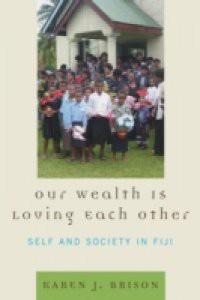Our Wealth Is Loving Each Other explores the fluid and context-bound nature of cultural and personal identity among indigenous Fijians. While national identity in Fiji is often defined in opposition to the West through reference to a romanticized pre-modern tradition, individual Fijians are often more concerned with defining their identity vis--vis other villagers and other groups within Fiji. When people craft self accounts to justify their position within the indigenous Fijian community they question and redefine both tradition and modernity. Modernity on the margins is an experience of anxiety provoking contradictions between competing ideologies, and between international ideologies and local experiences. Indigenous Fijians have been exposed to international ideologies and government programs extolling the virtues of pre-modern communities that place communal good and time honored tradition over individual gain. But other waves of policy and rhetoric have stressed individual achievement and the need to shake individuals out of community bonds to foster economic development. Individuals feel contradictory pressures to be autonomous, achieving individuals and to subordinate self to community and tradition. Brison examines traditional kava ceremonies, evangelical church rhetoric, and individual life history narratives, to show how individuals draw on a repertoire of narratives from local and international culture to define their identity and sense of self. Our Wealth is Loving Each Other is appropriate for upper level students and anyone with an interest in Fiji or anthropology.

